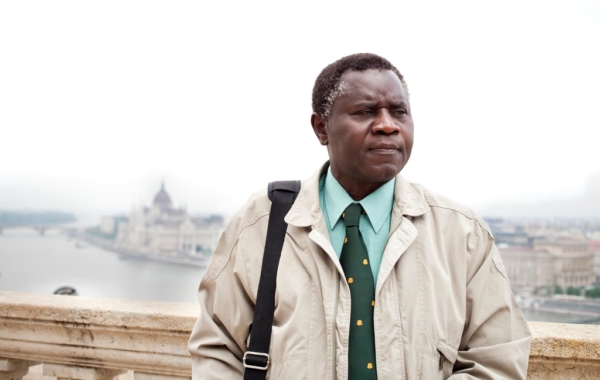![]() The very first scene of this exceptionally poignant drama involves Wilson (Cake-Baly Marcelo), a refugee from Africa (the specific country goes unmentioned), attempting to pass Hungary’s citizenship test. His face taking up most of the frame, so we can see him struggling to answer the questions put before him involving the country’s history and culture. At one point, he describes his impression of the Hungarian anthem, in particular a line he interprets as to meaning one shouldn’t run away when things get difficult. One of the officials at the hearing then accuses him, not a little condescendingly, of doing exactly that with regards to his home country.
The very first scene of this exceptionally poignant drama involves Wilson (Cake-Baly Marcelo), a refugee from Africa (the specific country goes unmentioned), attempting to pass Hungary’s citizenship test. His face taking up most of the frame, so we can see him struggling to answer the questions put before him involving the country’s history and culture. At one point, he describes his impression of the Hungarian anthem, in particular a line he interprets as to meaning one shouldn’t run away when things get difficult. One of the officials at the hearing then accuses him, not a little condescendingly, of doing exactly that with regards to his home country.
This won’t be the last time Wilson takes the citizenship test or that a native-born Hungarian he encounters treats him with disdain. For his part, he just wants to make a place for himself in Budapest, as the film repeatedly implies that he escaped from unspeakable violence and horror. To date, Wilson has learned to speak the language well enough and has secured a job as a supermarket security guard; he just hasn’t fully civics. To try and help, his employer gives him a phone number for a tutor, Mari (Ágnes Máhr), who lives in a sprawling home in the suburbs with her husband and adult sons, one of whom eyes Wilson suspiciously from the start.
Mari, though, instantly admires her new pupil for his attempts to better himself. Viewers can sense the chemistry between them, as along with being roughly the same age, they each have an open-mindedness toward the other’s culture. She takes him to museums and explains the importance of historical figures such as King Stephen I, aka Saint Stephen, while he plays the music of Fela Kuti for her. “It’s not normally what I listen to,” Mari says, but she admits to liking it. Gradually, romance blossoms between them, and for wholly understandable reasons. For Wilson, who lost his wife in what he refers to as “the war,” Mari represents a second chance. Meanwhile, Mari has become discontented with her sheltered, upper-class life, in which her family doesn’t seem to appreciate her much.
In a different movie, Mari could get a divorce and then marry Wilson, which would solve the issue of his citizenship. But complicating matters is Shirin (Arghavan Shekari), an acquaintance of his former roommate who shows up one night on his doorstep, pregnant and having recently escaped from a refugee holding facility. Not long after Wilson lets her in, she goes into labor, but since she lacks papers, she refuses to go to the hospital and instead gives birth right in the spare bedroom. At that point, she is afraid to venture outside lest she get caught and deported. Wilson, feeling a kinship with Shirin based on their mutual refugee status, offers to enter a paper marriage with her should he ever gain citizenship.
Unfortunately, Mari doesn’t find out about Shirin until things between her and Wilson have already progressed pretty far. The three characters trying to navigate around each other within a tight space, which feels ever more claustrophobic as tensions increase. Despite various standoffs, none of the protagonists is guided by malice; they just have an incomplete understanding of how difficult the situation is for the others, and that’s especially true for Mari with regards to Shirin and Wilson regarding Mari. The latter is unaware of what Shirin would endure if sent back to her native Iran, where as a single mother she would be a social outcast. Similarly, neither of the refugees realizes just how isolated Mari has become from her family and the life she has always known.
Director Roland Vranik aims a critical lens at European ethnonationalism. One gets the impression that native-born Hungarians were just fine with Wilson when he was confined to the margins. However, as he becomes more visible, their attitudes change dramatically. Not everyone is intolerant, of course, but it gradually becomes difficult to predict who will turn out to be a xenophobe and a racist. However, in certain scenes, the racism is played over-the-top. It’s the more subtle, almost unconscious expression of it that comes across as more realistic, and therefore disturbing.
The lead performances are uniformly excellent, especially the charismatic Marcelo as the soft-spoken Wilson. Mahr is also impressive as Mari, although her character can be maddening at times, as no matter how open-minded she claims to be, she remains a product of her Western values. Finally, Shekari gives a relatively low-key performance as Shirin, but given her situation, she’s instantly sympathetic.
What stays with us after the ambiguous ending are the moments of connection—not just between the main protagonists but among Wilson and the supporting characters. There are even times in which government bureaucrats seem swayed by his tragic story. It says something about our times, when the absolute modicum of human sympathy appears like a well-earned victory.
The Citizen Trailer – ArtMattan Films from ArtMattan Productions on Vimeo.

















Leave A Comment